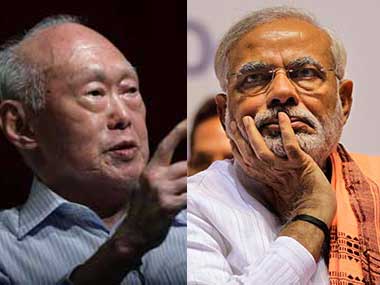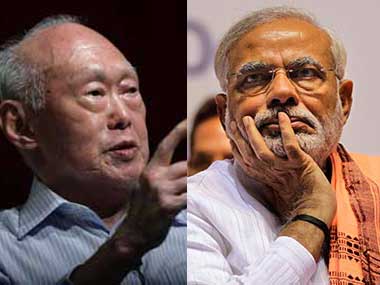There is a cottage industry in India trying to establish analogies for Narendra Modi. The usual suspects have had much fun with this. Hitler! Mussolini! Pol Pot! Genghiz Khan! they cry. Others claim: Indira Gandhi! Ronald Reagan! Margaret Thatcher! Perhaps. But if you look at the social contract that Modi has created, the best analogy may well be Singapore’s Lee Kuan Yew. Comparisons are always odious and never exact. There are differences; yet, there are commonalities. Much as Gujaratis has always been entrepreneurial, so have the Chinese in Singapore. Much as Singapore has rapidly risen to be one of the wealthiest nations in the world through good governance, Gujarat is growing, with the governance in place to sustain growth for a while yet. Both lack natural resources, other than location: Singapore as a convenient entrepot for the Indian Ocean/Straits of Malacca, and Gujarat with its long coastline and access to the critical shipping lanes from the Suez Canal/Straits of Hormuz to the Indian Ocean. Both lack water: Singapore has long depended on Malaysia for drinking water; until the Narmada Canal, semi-arid Gujarat has been critically deficient in water. [caption id=“attachment_655026” align=“alignleft” width=“380”]  Do the two leaders function in the same manner?[/caption] Both were backward regions: Singapore, after World War II, was a rather sorry swamp with extreme humidity and heat. Gujarat has had little agriculture, and its denizens therefore took to the sea and became traders. Both have had strict, disciplinarian governments (Lee and his party since about 1950 and Modi since 2001), under which they have prospered. There is very little corruption in both places, and that is intentional. Singapore chose its very best people for government, and gave them the authority and the responsibility to run clean governance; and they performed. In Gujarat, Modi has neither been corrupt himself, nor has he allowed others to be so (much to the chagrin of rentier bureaucrats and politicians), and his slogan of ‘minimum government, maximum governance’ is paying off. Both Lee and Modi, as benevolent if authoritarian leaders, have understood the value of equity, fairness and discipline. Singapore has forged a national identity where the racial or religious divides among the ethnic majority Chinese and the less numerous Malays and Indians have dissolved – like the American melting-pot – into a homogenous Singaporeanism. In Gujarat, asmita or cultural pride has overcome to an extent the divide between Hindus and Muslims. Despite the strenuous efforts of the mainstream media and the Congress to converge on a single-point allegation (“1,000 Muslims killed in 2002 riots”), it is clear that Modi’s religion-blind, laser-like focus on development has shown that equity, fairness and discipline are appreciated by Hindu and Muslim alike if they help them prosper. The philosophy both men have arrived at is that of a social contract between the state and the citizen. In ethical terms, one might postulate three approaches to a social contract: - Utilitarianism: A state where the focus is on the greatest good of the greatest number, and both rights and obligations are clearly spelt out - Deontological perspectives: A Gandhian State, where each decision is made from the point of view of its impact on the least powerful stakeholder affected by the decision - Oppression: A predatory state, which intentionally harms the interests of some or all of its citizens for its ulterior motives It appears that both Modi and Lee are Utilitarians at heart. A Utilitarian has a plan: in both these cases, the uplifting of their territories wholesale to global standards. Singapore, once a foul swamp, has become one of the best, most orderly and pleasant places to live and work in the world. Gujarat, semi-desert (but of course much larger than the city-state) is trying to make itself the best place to live and work in India at least, and one of the better ones in Asia. They have revived the social contract of Hindu-Buddhist Asia, which stands in contrast to oppressive and exploitative social contracts exported from West Asia and Europe and the Soviet Union. The empire of Chandragupta Maurya – as chronicled by Kautilya – was based on notions of the larger good of society. Even Ashoka employed an army of spies to ensure that malcontents were neutralised. This worked, as state and citizens had a mutual charter of rights and obligations honored by both. In a sense, this is the social contract articulated by Abraham Lincoln, “with malice towards none, with charity for all, with firmness in the right…” The deontological perspective, in contrast, will always speak for the rights of the marginalised. But it is open to manipulation: for example, excessive multicultural notions in the West are harming their native cultures. The Indian state pretends to be Gandhian, with the crocodile tears it sheds for ‘minorities’. However, in a bizarre twist, it is not the so-called religious minorities that need their rights protected by the state, it is the so-called majority community. The former apartheid state of South Africa is a good exemplar of the predatory state. It ensured that a few of its citizens (the conquerors) were able to exploit, oppress, and prosper from the efforts of the majority of its citizens (the conquered). The imperial state run by the British in India is another example. The current Indian state is also a predatory state, as it retains intact the British-manufactured setup intended to squeeze Indians. In practical terms, the state exerts all its efforts on making a few people immensely rich (mostly politicians) while the bulk of the population is impoverished and exploited – which explains why half of India’s population is still desperately poor after 65 years of sloganeering about the downtrodden. I once listened to the Congress Chief Minister of Kerala, Oommen Chandy, who claimed that “communalism, corruption, and violent terrorism” are the three ills that face the Indian nation. It is precisely these three that both Modi and Lee have addressed – no communalism (meaning true equality before the law, no special privileges), no corruption (things are decided on their fair merits), no violence (discipline and the carrot and stick have forced everyone to behave). One can claim that Modi’s Gujarat is not seen to be truly neutral to communities, but he seems to be getting there in stages. Thus Modi, like it or not, is closest to Lee Kuan Yew in essence; as Lee did, if given a chance, Modi may also bring prosperity to the people, all the people, of his nation. His implicit social contract makes him a most appealing candidate for Prime Minister.
Narendra Modi has been compared to Hitler and other authoritarians. But his social contract with the people of Gujarat shows that he is more Lee Kuan Yew
Advertisement
End of Article
Written by Rajeev Srinivasan
Rajeev Srinivasan is a management consultant and columnist, and a fan of art cinema. see more


)

)
)
)
)
)
)
)
)



